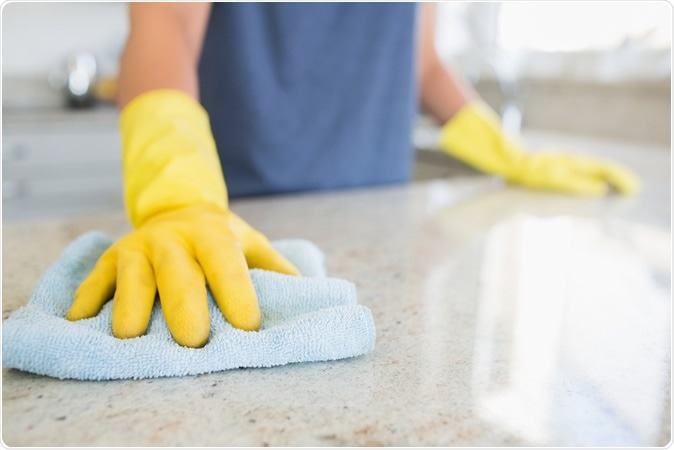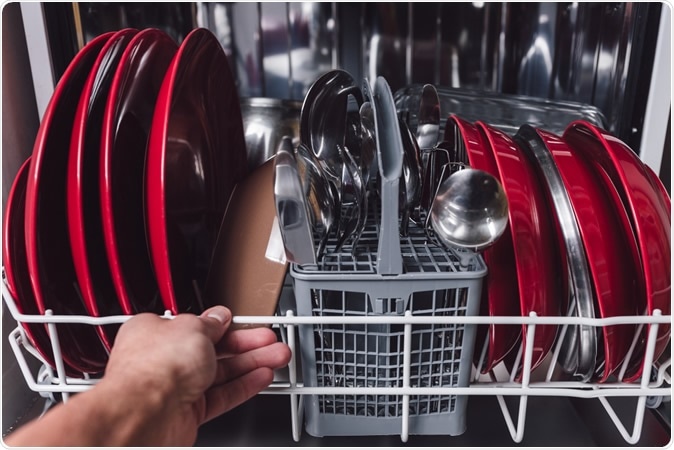As the novel coronavirus diseases (COVID-19) spreads to over 169 nations and territories across the globe, grinding to a halt nations and their healthcare systems, more and more countries are resorting to ‘lockdowns’ to prevent human to human transmission of the virus. Lockdowns specifically intend to keep all persons at home for as much as possible to break the chain of transmission. Commonly asked questions remain about keeping the virus from entering the home.

Image Credit: ESB Professional / Shutterstock
Recommendations for cleaning the homes and preventing entry of viruses
While most people are locked inside their homes either working from home or just staying within, the homes become one of the major forts against the viral infection. UNSW virologist Dr. Sacha Stelzer-Braid has recommended certain measures for a clean home free of the virus. Some of the recommendations include:
Detergents & disinfectants
- Detergents and disinfectants need to be used to clean the surfaces.
- Surfaces that receive more touch and contact compared to others such as doorknobs, handles, benches, tabletops, switches, keyboards, mobile phones, fridge doors, remotes, taps, etc. need repeated cleansing of at least twice a day.
- All items that have been brought inside the house need to be given a good wipe down with alcohol-soaked wipes. This includes keys, wallets, mobile phones, bags, etc.
- Non-porous items must be wiped down with soap water, and fresh groceries and vegetables and fruits need to be washed thoroughly.
- Disinfectants and hand sanitizers are not enough to kill the virus, and detergents need to be used, say, experts.
- Before disinfection, the house needs to be washed clean with hot soapy water followed by disinfectants.
- Commonly effective agents include 70 percent alcohol, and diluted bleach says advisories.
- Products containing bleach (sodium hypochlorite) must not be mixed with any other chemicals. They can be diluted in water only. As per the recommendations from the Centre for Disease Prevention and Control (CDC), bleach solution can be made using five tablespoons (one-third cup) bleach per gallon of water or four teaspoons bleach per 4 cups of water. Gloves should be worn to protect the skin, and the room cleaned should have proper ventilation.
- Products with isopropyl alcohol can be used for hard surfaces, but it is flammable.
- Hydrogen peroxide should not be mixed with vinegar as it can lead to the formation of corrosive acid.
- All the surfaces need to be cleaned using the S pattern. This can prevent the recontamination of areas already covered and cleaned. For cleaning, disposable gloves must be work, and correct techniques should be followed. If the same piece of cloth is used for cleaning each day, it should be laundered after cleaning and sun-dried.
- Both liquid soap and bar soaps used for 20 seconds along with water are good to clean the hands say, experts.
- Dishwashers may be a good idea to cleanse utensils and cutlery because they can use hot water and detergent to clean.

Image Credit: Cicero Castro / Shutterstock
Home habits
- Taking off shoes that have been outside before entering the house. Shoes can bring in the virus, and other germs inside say experts and need to be taken off outside the doors.
- Dr. Stelzer-Braid said that the air of the house needs to be flushed out by keeping the doors and windows open.
- She added that good hygiene for the home needs to start before entering the front door.
- Once inside the house, hands need to be washed thoroughly for at least 20 seconds with soap and water.
- The novel coronavirus can survive outside the body of solid surfaces such as plastic and steel surfaces for up to 72 hours, say researchers. Thus all such surfaces need to be washed thoroughly.
- If one of the members of the house is infected with the virus, they need to be isolated to one part of the house with minimal contact with others. The period of isolation is 14 days. They should have their own bathroom and separate room. Their bedsheets and clothes need to be handled using gloves and after wearing surgical masks. All articles used by the person need a thorough clean to prevent transmission. Their clothes and cutlery need to be kept separate.
- Mouth and nose should be covered with a tissue or elbow while coughing and sneezing to prevent the spread of aerosols borne infection. Tissues should be discarded immediately in a closed bin, and hands should be washed thoroughly. Hands should also be washed after going to the bathroom and before eating.
These habits will prevent not only the spread of coronavirus but other infections in and around the home as well say, experts.